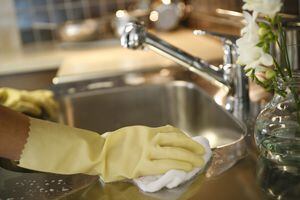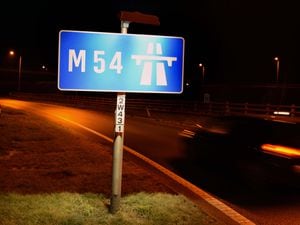Magic ingredients for your lockdown cleanup
Lockdown cleanup? There's a magic ingredient which will leave a bitter taste.

It's clean, green, and probably cheaper than some of those products with fancy brand names.
Did white vinegar come to mind?
A new book by Ludlow publishing outfit Merlin Unwin shows how folk can turn their backs on all those industrially-produced cleaning agents and make their own environmentally-friendly alternatives which work just as well.
Or so says Austrian author Manfred Neuhold, who has come up with 160 easy recipes to inspire people to make their own cleaning products, ranging from washing up liquids to rust removers, and from dishwasher powders to air fresheners.
And often people have already got everything they need in their kitchen.
"You don't need a chemical laboratory or huge stock of raw materials," he says in his book Green Clean Your Home.
"You can get by with just a few basic materials, which are combined in different ways depending on the intended use."
He says that industrially-produced cleaning agents usually contain a whole range of substances that guarantee hygienic cleanliness, but at the same time have side effects on health.
"Is our dazzlingly clean living environment, which smells of synthetic aromas, really a healthy environment for us? Chemists from environmental and consumer protection organisations regularly examine the cleaning chemicals available on the market. Many products contain combinations of substances for which the term 'poison cocktail' is perhaps not entirely inappropriate.
"Especially in those products that smell strongly, toxins lurk."
Manfred, who has written a range of books on natural products, says a cleaning agent should loosen dirt and make it easy to remove in solution. What it does not need to do, and in the interests of a healthy living environment should not be able to do, is disinfect your home.
"The disinfection of a room is necessary in public toilets and clinics, but certainly not in a normal house with residents without infectious diseases.
"The fear of bacteria lurking everywhere is not based on scientific knowledge, but on the influence of the advertising of the cleaning agent industry."
Bacteria, he says, are everywhere, and very few are harmful to health, and many actually promote health.
"Some are even vital for us. So anyone who treats all bacteria the same and eliminates them chemically does no good for himself or his health. On the contrary, it appears that children who grow up in a germ-free household suffer much more from a weakened immune system and a whole range of allergies than those whose immune system is allowed to deal with bacteria and germs in a natural way.
"It is said for good reason that children who grow up with pets are the healthiest children. The immune system of a child who often comes into contact with a dog's tongue is challenged and strengthened. It will be able to cope with other, greater challenges in the future.
"There is increasing scientific evidence that children cannot develop their immune system sufficiently in an environment that is too clean."
Folk who assume that a clean and germ-free kitchen must smell of cleaning agents are, he says, mistaken.
"The 'clean' smell only signals that the kitchen is chemically contaminated."
One of the ingredients which appears again and again in the book is vinegar, used diluted to suit the purpose, which Manfred says forms a good basis for all cleaning purposes, except to remove grease.
An area where its merits were well known to our grandparents is as a glass cleaner, with crumpled newspaper used to finish the drying job, streak-free.
"It still can't be beaten for that purpose today."
White vinegar is also useful in the laundry.
"As a fabric softener it not only makes the laundry soft and fragrant, but also freshens up the colours by removing any limescale residues."
Other ingredients which appear in his recipes include washing soda – sodium carbonate – and bicarbonate of soda, which is baking soda and not the same as baking powder.
Among his general tips for the kitchen are to sprinkle grease splashes in the oven with salt while they are still fresh then, as soon as the oven has cooled, you can simply wipe it all away without leaving any residue.
And here's a mild universal cleaner for the bathroom. What you will need is 150ml of white vinegar, 20ml of coconut surfactant, 100ml of water, and 10 drops of essential lavender oil.
That's the cast, but we won't tell you what happens next because we don't want to spoil the book for you – it is sold by Merlin Unwin Books and costs £16.99.





